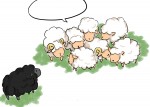As UCLA students we pride ourselves in our True Bruin Values, which include respecting the free expressions of the others’ opinions. Despite the notion that one attends college to be enlightened by new ideas, we may actually just be absorbing one-sided opinions that, in the long run, subtly prevent our brain from processing different viewpoints.
It comes as no surprise that a large number of universities in the U.S. lean to the left politically and ideologically. A study suggests that more college professors have identified themselves as “liberal” since the 1990s. Predictably, according to the study, this change has influenced students’ political leanings, with a 9.2 percent increase in students who identify themselves as “liberal” that were tracked from the beginning of college to graduation.
In my experiences, constant exposure to the “open-minded,” liberal environment at UCLA creates a seemingly cohesive liberal academic and social community. However, this cohesion, whether real or only perceived, may leave students’ minds unchallenged.
Irving Janis, a research psychologist at Yale University, proposed a now-famous concept, groupthink, in 1971 in response to John F. Kennedy’s unintelligent decision regarding the Bay of Pigs Invasion. Groupthink suggests that members of a cohesive community are more inclined to conform to the group’s general consensus, in part to avoid unwanted conflict. Janis further highlights that non-deliberate internalization of the group’s collective normative ideas and beliefs results in unintended negative outcomes.
This psychology concept is topical to the current political and social climate, both on and off of university campuses. Especially when the right to free speech is getting more restricted on university campuses, it almost encourages students to express opinions only if it is generally accepted by the norm, catalyzing the effect of groupthink.
One of the potential dilemmas of groupthink is that students submit their thoughts to the majority without deliberately examining viewpoints in full. The internal rejection of outside or deviant ideas builds up as the concept of groupthink comes into play, which is a trend that I’ve been noticing. Similarly, conservative students on campus are not immune to this effect.
Striving for equality and acceptance has always been an overt hallmark of liberal universities, but are all students and faculty members really taking into consideration all different and possibly rational viewpoints?
The answer is an obvious no.
Across the country, cases of disinvitation of speakers with opposing viewpoints, the construction of limited free speech zones and overly sensitive trigger warnings are consequences and confirmations of groupthink. While on campus, I once encountered a scene where someone refused to befriend a self-identified conservative solely due to their political leaning.
As this suggests, some liberal students are as “accepting” as they claim only when the idea is within their own scope or zone of tolerance. And many devalue the non-liberal opinions of the others. For me, this discrimination against opposing viewpoints is nurtured by the homogenous, left-leaning environment across universities, which lacks a rigorous, well-rounded intellectual platform for students to truly analyze different viewpoints.
With the addition of an overwhelming amount of liberal professors, students can easily be drowned within the unconscious left-leaning perspectives. Especially in the social sciences and humanities, students have fallen into the comfortable bubble where they are unable to tolerate viewpoints that produce discomfort since there are simply not enough places on campus where conservative viewpoints are respectfully recognized. Simply put, there is no viewpoint diversity.
Beyond that, the research itself can also be biased when the researchers in the field are predominantly liberal, as many of these researchers – intentionally or not – select research topics that would hypothetically lead to a result that favors liberal ideologies. One example that a recent Scientific American article referenced is how, in a meta-study on intolerance, social psychologists would study tolerance of allied target groups, such as the LGBTQ community, and draw the conclusion that liberals have a higher tolerance than conservatives towards these specific target groups.
However, as the study also suggests, the end conclusion reverses when the selected target groups, such as Christians, are those typically allied with conservative political beliefs, revealing the liberals to be the intolerant ones. This is just one example of how liberal political biases skew the results found in academia.
These small changes and biases toward the left, present in both the university environment and larger fields within academia, shield students’ minds in such a way that automatically rejects opinions, ideas and beliefs that deviate beyond the student’s comfort zone.
As a self-identified liberal, I lean left towards most social and political issues, and generally agree with liberal ideas and beliefs I hear on campus. However, regardless of political leaning, one should be mindful and actually open to having a dialogue in regards to any opposing viewpoint, instead of immediately dismissing it. Our individual psyches and our collective judgment should not suffer from the effects of groupthink, and I believe constant exposure to contrasting viewpoints should be encouraged.
Our school’s motto is Fiat lux: “Let there be light,” light being a metaphor for knowledge. Let our minds be exposed to all sources of light.
